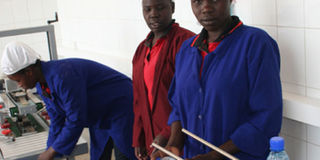Hope as local entrepreneurs establish plants in West Nile

Workers pack water bottles at Malaika Water Plant in Kuluva in Arua District. The water plant and other new factories have employed a big number of youth in the West Nile sub-region. PHOTO BY CLEMENT ALUMA
What you need to know:
- Life in West Nile is fast changing with locals starting to invest heavily in factories and other large scale projects that have improved the people’s livelihood. Felix Warom Okello writes that despite the impressive results, the sub-region is beginning to experience strain on resources.
From a distance, apartments, warehouses and office buildings spring up on the sides of roads stretching from Pakwach to Arua District.
This is not just a sign of economic growth in these two districts found in West Nile. New factories filled with complex machines are taking shape, indicative of wealth and colossal investments in Nebbi, Zombo and Arua districts.
Investors are rushing to establish factories in the West Nile, a sub-region that had largely remained underdeveloped due to government’s delays in extending the power grid to the area.
For the bigger part, the main attraction for investors is electricity which is connected to most areas.
Another obvious pull factor is growth in the local market along with the high demand for products from South Sudan and Democratic Republic Congo (DRC).
Previously, efforts to sustain factories were frustrated. For instance, Parombo Cotton Ginnery, Bee Natural Products and Nile Foam Mattress relied on generators that turned out expensive.
Seven Hills factory, Ayuda Coffee Factory in Zombo, Pakwach Cotton Ginnery all shut down due to inadequate power supply.
But today, the region boasts of a variety of new factories such as Agu Mineral Water Processing Plant in Zombo District, Juice Processing factory, Malaika Mineral Water plant, Leaf Tobacco Company and a beef processing factory in Arua District.
Opportunities
Mr Emmanuel Ajedra, proprietor of the Juice Processing Factory, invested about Shs5 billion from personal savings while Mr Jurua Peter, invested Shs15 million to start the beef processing factory.
Their two business ventures offer jobs to about 40 skilled and semi-skilled people. With Agu Mineral Water finally on the market, more youths are set to enjoy the cumulative employment opportunities.
To Mr Joseph Ogen, a businessman in Nebbi Town, an industrial region is no dark dungeon but a place of light. “It will boost self-esteem and provide more job opportunities for the ambitious than ever could be found in the villages,” he says.
As the factories come in, people expect economic recovery, scaling up cross-border trade with South Sudan and DRC and minimal transport costs.
There are also prospects of advancement that will offer chance to learn skills that reward merit, value addition to crops, and have increased production through mechanisation of agricultural products.
Currently, South Sudan and DRC depend on Ugandan products such as mineral water, building materials and agricultural products.
West Nile, strategically located as a gateway to the two countries, offers opportunity to grow economically.
Challenges
West Nile sub-region was zoned for fruits and apiary by the ministry of Agriculture but farmers who took to the enterprises have been crying foul due to lack of market for their products. About 50 per cent of mangoes grown in Uganda go to waste according to statistics from Makerere University School of Food Technology Nutrition and Bio-engineering.
But this trend is set to change. “This is an opportunity for the farmers in that they now have ready market for their fruits,” Mr Ajedra says.
Now the juice processing plant is fully equipped with treatment cylinders, a laboratory, and the pulp units save for the homogeniser which is yet to be fixed.
More so, Yumbe District recently acquired a Shs1 billion mobile fruit processing truck from funds provided by Makerere University Food Technology and business incubation centre to process the fruits.
Mr Jurua says taking off has been slow because of the inadequate power provided. This has made his equipment that he bought at Shs300 million to lie idle.
“I am frustrated because I had all the ability to do what it takes to handle all types of meat, create employment and market for our animals but here I am still waiting for the power connection since I applied for it,” Mr Jurua explains.
There are several types of meat packaged at the plant such as bacon sausages, minced meat and some chicken products. “Despite the problems, I earn about Shs15 million monthy,” he says.
Going forward
A businessman in Arua Town, Mr Salim Ahmed recommends the direct involvement of local entrepreneurs in manufacturing in the sub-region.
A farmer in Manibe Sub-county, Ms Josephine Adiru, lauds the presence of factories but makes pleas for value addition.
She says: “This offers us ready market and this will boost our production rate. But we will need value addition so that the products compete favourably with demands of the factories.”
It is now evident that as more people move to urban areas to work in the factories, overpopulation is likely. This is causing more strain on available resources, making life more challenging especially in Arua Town.
Planning a city’s infrastructure, such as roads and services, is becoming difficult in slums and other areas in the sub-region.
Facts and figures
Location
West Nile sub-region is a region in north-western Uganda. The sub-region is bordered by the Democratic Republic of the Congo to the south and west, by South Sudan to the north and by the Albert Nile to the east. Arua Town, with an approximate population of 65,000 people, is the commercial hub in the sub-region. Arua lies approximately 420 kilometres by road, northwest of Uganda’s capital, Kampala.




